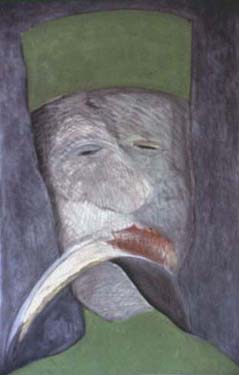I am mired in revisions for an academic essay, and badly in need a poetry break.
Here is an intriguing "statement" of poetics that Barbara Guest apparently presented in 1998 at Naropa. It is reprinted in
How2: http://www.asu.edu/pipercwcenter/how2journal/bg_memorybank/
bg_memory.html#robinson
How about some posts on her ideas?
A Reverie on the Making of a Poem, June 1998
 Arrived at the terrain of her sensibility
Arrived at the terrain of her sensibility
 –a stasis and
–a stasis and
 pull in the composition physical–
pull in the composition physical–
 remember, a contradictory tug phantom-like–
remember, a contradictory tug phantom-like–
 upon the environs of the poem–;
upon the environs of the poem–;
think of poem going through these stages
struggle
balance and non-movement
preparation
always an inert force in poem to try to bring it back and force this on the
surface of poem
 *****
*****
 darkening of the page and then withdrawal
darkening of the page and then withdrawal
of darkening: gradually the page lightens,
gradually the page lightens,
the invisible heaviness lifted itself.
lifted itself.
Perhaps–cinematic–
 this elevation.
this elevation.
With no warning (from inside the text,
mind attached to the text)
method to elevate poem from surface
 *****
*****
 and attacked by dizziness of atmosphere!
and attacked by dizziness of atmosphere!
In the attack of suspense; a masterful
 development of plot and erasure.
development of plot and erasure.
 *****
*****
The echo the words grant us on page and off!
 sound of the last few words–;
sound of the last few words–;
they will be abolished and this new movement
embracing an echo,
only discovered here the poem
 sustains marginality–
sustains marginality–
destructiveness
 *****
*****
the timing of this substitution one idea for another
for another
 Countdown!
Countdown! knuckle on the hand
knuckle on the hand
illustrates itself tames–
tames–
 the sentence covering it
the sentence covering it
 with a fist, held loftily–
with a fist, held loftily–
 muscular control . . . fastidiousness
muscular control . . . fastidiousness
 continual restiveness, also
continual restiveness, also
timing supplant strong attack
struggle necessary–but not to let go
risk
 *****
*****
 a blissful discontinuity
a blissful discontinuity
 orders this estrangement of each
orders this estrangement of each
 available word and the disinclination to advance (at
available word and the disinclination to advance (at
that point in time) or desire to
to hurry toward an abrupt
hurry toward an abrupt
 ending–
ending–
 rushing or spectacular jumps over the hurdles–
rushing or spectacular jumps over the hurdles–
as in conversation
or
do not hurry the poem
but take chances
motion, movement in poem
 *****
*****
 an advanced punctuation bursting from vases
an advanced punctuation bursting from vases
 into an arena of sound
into an arena of sound
 the aroma continues as a cloud of invisibility shelters
the aroma continues as a cloud of invisibility shelters
 ghost exiting
ghost exiting
 there from center right:
there from center right: solid objects merciless.
solid objects merciless.
mood
what else can poem perform in its arena
of possibilities
the phantom of possible ideas
 ***
***
 (maneuvering inside a volume)
(maneuvering inside a volume)
 a force majeure to shred the atmosphere
a force majeure to shred the atmosphere
 this fist its imprint almost
this fist its imprint almost
observable!
poet in charge
 *****
*****
and all the while movement coalescing
movement coalescing
with the strict idea–
Startling these maneuvers!
 of idea and erasure.
of idea and erasure.
not to lose sight of the ideas, and movement they must meet
not to tell all possible choices in poem







.jpg)




